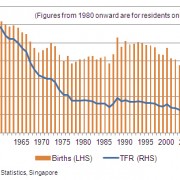Singapore’s resident total fertility rate (TFR), or the average number of births a hypothetical woman can expect to have by the end of her childbearing years if she experiences the age-specific rates in a given year, has been well below the replacement level (generally considered to be 2.1) since 1976. Singapore has one of the lowest fertility rates in the world, together with Hong Kong, China; Japan; Republic of Korea; and Taipei,China (United Nations 2009). Our projections (Institute of Policy Studies May 2012) show that if the TFR remains constant at 1.24 births per woman from 2005, Singapore’s citizen and permanent resident population (known collectively as the “resident population”) will decline from 2020. Read more.

About Christopher Gee
Mr. Christopher Gee is a Research Associate at the Institute of Policy Studies in Singapore. He works in the Demography and Family cluster at the Institute of Policy Studies.

Search
Subscribe / Connect to Asia Pathways
Subjects
- Agriculture and natural resources
- Blog
- Capacity development
- Climate change
- Economics
- Education
- Energy
- Environment
- Finance sector development
- Gender
- Governance and public sector management
- Health
- Industry and trade
- Information and Communications Technology
- Infrastructure
- Miscellaneous
- Population
- Poverty
- Private sector development
- Regional cooperation and integration
- Sanitation
- Social development and protection
- Transport
- Uncategorized
- Urban development
- Video Blog
- Water
Recent Posts
- Transforming ASEAN: Advancing Regional Integration, Social Inclusion, and Environmental Sustainability
- Development of the Creative Economy in Asia and the Pacific
- Kashima City’s Great Transformation: Where Industry Meets Community
- Mechanization Driving the Future of Agriculture in Asia
- Natural Capital: Valuing Nature to Protect and Restore Ecosystem Services for Sustainable Development





Recent Comments